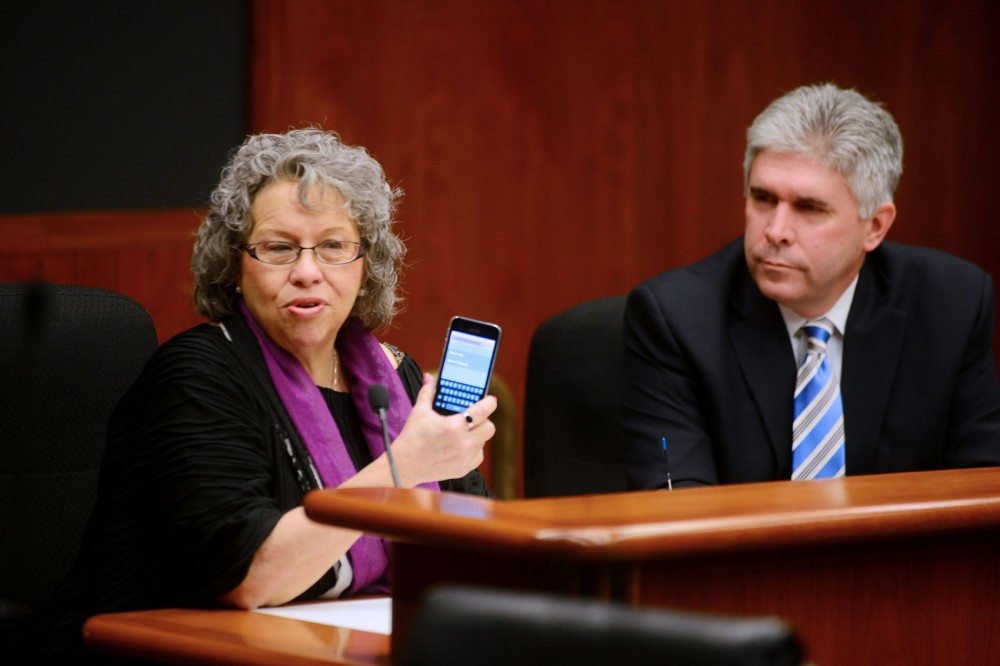Following a series of smartphone thefts on and around the University of Minnesota campus, a committee in the Minnesota House of Representatives discussed a proposal Thursday that could render smartphones useless after they are lost or stolen.
The bill would require new phones purchased in the state to have a “kill switch” option so if stolen, data could be erased and the phone disabled. If necessary, the device’s owner could recover the information and reactivate the phone with a passcode.
University officials and others testified at the meeting and said a kill switch bill should pass in order to deter criminals. Others argued the bill would be impractical, raise security concerns and hinder cellphone plan profits.
“Kill switch legislation would greatly undermine the profit motive for [criminals],” University police Chief Greg Hestness said at the meeting.
In major U.S. cities, about one in three robberies involve smartphones. Since the beginning of the school year, a majority of robbery cases on and around the University campus involved cellphones.
If passed, the legislation would be the first of its kind in the country. It was initially introduced to get the discussion started and put pressure on cellphone carriers to offer a kill switch themselves, said the bill’s leader, Rep. Joe Atkins, DFL-Inver Grove Heights.
But officials from CTIA-The Wireless Association, a nonprofit that represents the wireless communication industry, said a “one size fits all” approach to smartphone theft won’t work in practice.
Jamie Hastings, vice president of external and state affairs for CTIA, said because wireless service operates without regard to state lines, a Minnesota-specific bill would conflict with existing technical and operation requirements.
The bill, Hastings said, would also violate the U.S. Constitution, because it would burden the national wireless device and service market by dictating operational and technical specifications of mobile devices.
John Marinho, vice president for technology and cyber security for CTIA, said he doesn’t support the bill, because it would undermine safety and security. If every phone operated on the same system, he said, hackers could unlawfully kill phones easily.
MSA President Mike Schmit, who testified as an individual at the hearing, said students could benefit from the proposed legislation. He said that while the University has already taken steps to increase safety near campus, “the incentive for criminals to target students and the broader community still remain.”
Schmit said a resolution on kill switch capabilities was drafted for an MSA forum — potentially gaining the group’s endorsement as the legislation gains traction at the Capitol — but failed to pass after members raised consumer security and protection concerns.
Atkins said critics of cellphone companies say the companies may oppose a kill switch option because consumers may feel more protected and drop their insurance plans, meaning a drop in profits.
The benefits of the proposal, Schmit said, outweigh the opposing argument’s concerns.
“It’s important that the safety of people, especially at the University of Minnesota, is protected before profits made on these insurance plans,” he said.
Hastings said at the committee meeting that it’s unclear what the costs will be for wireless phone companies to implement the change, but that when an industry is regulated, there are usually subsequential costs.
President Eric Kaler said in an interview that he supports the measure and that he finds the opposing argument surprising.
“It’s interesting that some of the wireless carriers push back pretty hard,” he said.
The California Legislature is mulling a similar kill switch proposal, and U.S. Sen. Amy Klobuchar, D-Minn., has introduced a kill switch bill for Congress to consider.
Another House committee will discuss Atkins’ bill in the coming weeks. If passed, the Minnesota kill switch bill would go into effect Jan. 1, 2015.
Vice President for University Services Pamela Wheelock said in a statement Thursday that she supports the bill.
“Along with the University’s public safety action plan, this type of state legislation will only help make our shared efforts stronger,” she said in the statement.

















